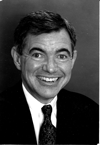By Ed Gold
After having found his way through the maze of twisting corridors at 20 Washington Sq. N., Makar now feels comfortable and confident in his no-frills but sufficient office and wastes no time in getting to his daunting responsibilities:
“I always think it’s better to tell the truth because then it’s easier to remember what you said. I’m here to raise money,” he says matter-of-factly.
“I feel my whole career has led me to this place. This is such a wonderful organization and I hope to wind up my career here.”
Makar, who is 55, brings to his new role what appears at first glance to be an eclectic background; but he feels all the pieces fit together to prepare him for this new challenge.
“My dad was in the restaurant business and I learned early in life how to deal with people. Sometimes,” he says with
a smile, “I feel when we’re serving lunch here that I’m back in the restaurant business.”
His B.A. in English and theater from Boston College, will also help, he feels. He honed his writing skills at college and also learned about orchestration and directing, valuable lessons in heading a complex organization that he asserts will need greater exposure.
His master’s degree from Suffolk University, Mass., in higher education administration sharpened management abilities. And his more recent stint with the American Lung Association, where he had the title of director for major gifts, provided the experience he now hopes to turn into action for the Caring Community.
He also spent four years as a volunteer at SAGE, a group that helps gay seniors, where he learned how important strong organizational support is in the care of older citizens.
Makar is also not without diplomatic skills. With much sincerity, he calls his key directors — Operations Director Paul O’Brien and Program Director Wendy Golub — his “Tiffany Team.”
As to early decision-making, he will need to make a stronger effort to get foundation and grant funding. He plans to bring more corporate funding into Caring Community’s annual gala. He will be exploring joint-venture funding. And he will go after more “special projects” funding — such as, for example, the recent purchase of new computers for the four Caring Community centers where many seniors have adapted to the communications revolution.
While the Department for the Aging remains the most important funding source for Caring Community, its contribution has not taken into consideration inflationary factors — in effect freezing salaries as well as allocations for food and insurance.
Makar points out that at the same time medical technology has extended life spans conspicuously, requiring more homebound support and greater imagination in meeting the needs of the frail.
“Two years ago,” Makar recalls, “I visited the L.B.J. Library in Texas. I realized then that the man was only 68 when he died. Today, that’s really young.” Among his ideas for helping the expanding homebound population, he plans to acquire books on tape for those with poor eyesight, and to introduce a program of conference calls for the elderly so 10 or more seniors could join the same conversation, which he feels will help them maintain contact and “feel they are part of the community.”
Makar adds: “As our people live longer, they will need more assistance in managing their finances, more help from doctors and more home visits. Caring Community will have to meet these needs.”
Makar’s affection for his mission extends to every aspect of the program. He boasts about the 73,000 meals served last year at the Caring Community’s centers and to the homebound, the repair service completing 1,000 home repairs and escorts making 550 assistance trips during the year.
He also takes pride in programming efforts at all four centers: Besides Washington Sq., activities take place at Presbyterian Church on 12th St. and Fifth Ave., Lady of Pompei Church on Carmine St. and the Independence Plaza center in Tribeca.
In addition to the upturn in computer classes, there are classes in tai chi, art history, ballroom dancing, French and Italian and Shakespeare, to name a few, in addition to practical sessions on tax preparation, and how to apply for “unclaimed funds” held by the State Controller’s Office.
Makar sits back in his chair, relaxed and affable. He savors the challenge and also likes the environment.
“We’re in a real community,” he reflects. “There’s a good spirit here. It’s really satisfying.”
He finds his chair a good fit. And it’s become much easier for him to locate his office.
WWW Downtown Express






























